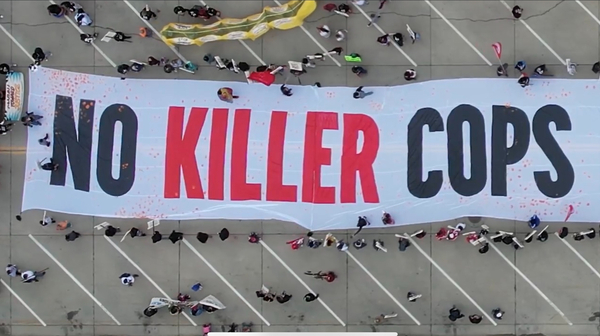
- Details
- By Darren Thompson
NDN Action Network (NDN), a Rapid City-based 501(c)(4) entity and Indigenous rights group, organized the march, dubbed “March Towards Justice: Holding Police Accountable,” near the Pennington County Jail.
“Today is the continuation of our expression of our love for the people, for our community,” NDN Action Network Local Organizer Sunny Red Bear said in a statement. “We marched to give power to our voices but what we do now is where the power of our collectiveness is going to become a catalyst for systemic change. We have a plan, we have numbers, and we have a prayerful path forward.”
Rapid City has a population of more than 77,000 people, and while 11 percent of the city’s population identifies as American Indian or Alaskan Native, Indigenous people make up more than 60 percent of Pennington County inmates, according to a report published by the Pennington County Sheriff’s Office.
The disproportionate number of Native Americans in the criminal justice system is not unique to Rapid City but is an issue across the state. While Native Americans make up 8.57 percent of the state’s population, they
represent more than 35 percent of the prison population, according to the South Dakota Department of Corrections. As of April 30, 2023, there are 327 American Indian women out of 564 total prisoners in the state’s only women’s prison in Pierre.
According to data provided by NDN, there have been 79 police-involved shootings in South Dakota from 2001 to 2023, with zero convictions of police. Seventy-five percent of victims were Indigenous.
South Dakota is a non-Public Law 280 state, meaning the state’s nine Indian reservations and the federal government share criminal jurisdiction on Indian lands. According to the U.S. Department of Justice, between 50-60 percent of the criminal caseload for the U.S. Attorney’s Office is from Indian Country. It is unclear what percentage of Indian Country South Dakota represents in those figures.
“The March today is a step on our path towards peace and justice,” said NDN Action Network’s Managing Director Robby Burroughs. “We will continue to unite diverse communities, working together to keep our relatives and community members safe from violence. We look forward to working with the DOJ to advocate for police reform and enhanced police accountability. The old way is not working. We are speaking truth to power to create a positive change for our community.”
The march also asked for the removal of police officers from Rapid City schools. According to the Civil Rights Data Collection, 100 percent of expulsions from Rapid City area schools are of Native American students.
“School resource officers are supposed to foster a safe community—but we’re here to tell you, that’s not happening,” NDN Action Network local organizer Anissa Martin said in a statement on Tuesday. “There have been many cases in which officers have been violent and inflicted harm on Indigenous children. Here in Rapid City, when a student didn’t meet the dress code, an SRO picked them up and slammed them on their head.”
Earlier this year, Native News Online reported on an inmate death of an American Indian man in the Pennington County Jail. There have been numerous deaths of American Indian people in the Pennington County Jail over the years, but accurate data is difficult to obtain.
Last week, Rapid City Mayor Steve Allender issued a statement about the march, saying the demonstration did not have a permit. He warned the public to avoid the demonstration and to report any suspicious activity. Allender’s last day in office was Monday, July 3, and is replaced by Mayor-elect Jason Salamun.
Tuesday’s march also highlighted other opportunities for supporters to join in advocating for Indigenous rights, including an online petition asking for an immediate civil rights inquiry into the Rapid City Police Department and the Pennington County Sheriff’s Office. The petition is also calling for the establishment of third-party mechanisms to investigate any incidents involving law enforcement with the public, defund the police and increase funding in community education, removal of all school resource officers from Rapid City Schools, and end the killings of Indigenous people by law enforcement.
More Stories Like This
Native News Weekly (August 25, 2024): D.C. BriefsNavajo Nation Mourns the Passing of Former Vice President Rex Lee Jim
Deb Haaland Earns Endorsement From Communications Workers of America Local 7076
University Soccer Standout Leads by Example
Two Native Americans Named to Democratic Congressional Campaign Committee's“Red to Blue” Program
Help us defend tribal sovereignty.
At Native News Online, our mission is rooted in telling the stories that strengthen sovereignty and uplift Indigenous voices — not just at year’s end, but every single day.
Because of your generosity last year, we were able to keep our reporters on the ground in tribal communities, at national gatherings and in the halls of Congress — covering the issues that matter most to Indian Country: sovereignty, culture, education, health and economic opportunity.
That support sustained us through a tough year in 2025. Now, as we look to the year ahead, we need your help right now to ensure warrior journalism remains strong — reporting that defends tribal sovereignty, amplifies Native truth, and holds power accountable.
 The stakes couldn't be higher. Your support keeps Native voices heard, Native stories told and Native sovereignty defended.
The stakes couldn't be higher. Your support keeps Native voices heard, Native stories told and Native sovereignty defended.
Stand with Warrior Journalism today.
Levi Rickert (Potawatomi), Editor & Publisher

